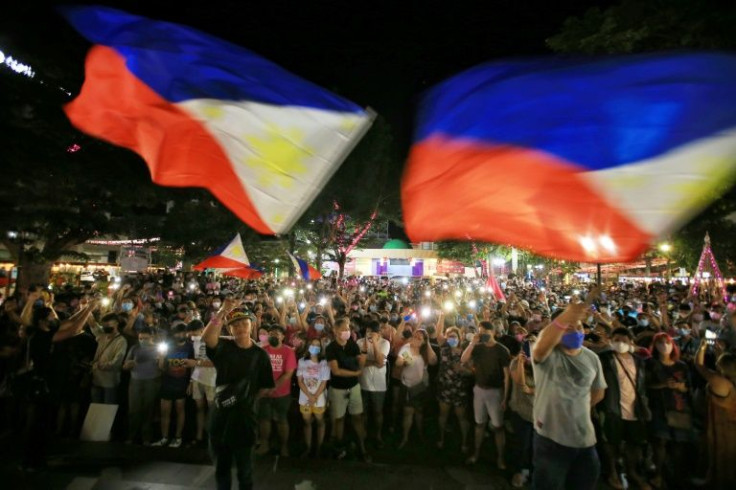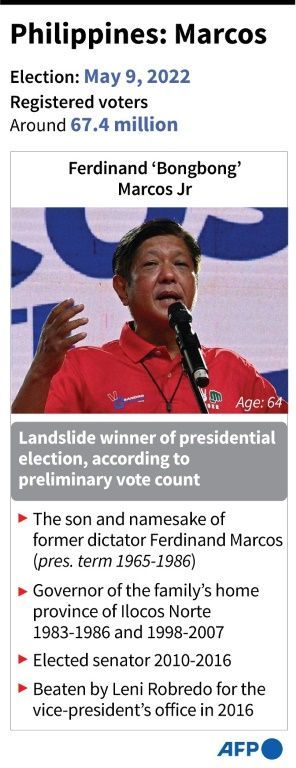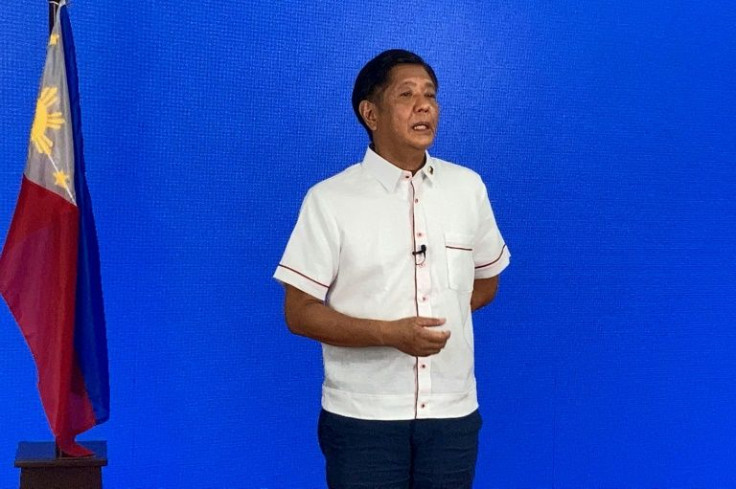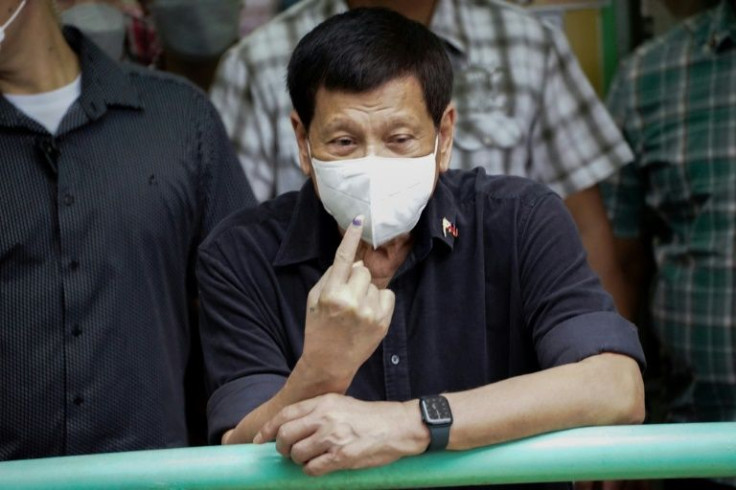Son Of Late Philippine Dictator Wins Presidency In Landslide
The son of late Philippine dictator Ferdinand Marcos cemented a landslide presidential election victory Tuesday, after Filipinos bet a familiar but tainted dynasty could ease rampant poverty -- while dismissing warnings the clan's return will deepen corruption and weaken democracy.
With an initial count almost complete, Ferdinand "Bongbong" Marcos Jr had secured over 56 percent of the vote and more than double the tally of his nearest rival, liberal Leni Robredo.
His now unassailable lead of 16 million-plus votes spells another astonishing reversal in the fortunes of the Marcos family, who have gone from the presidential palace to pariahs and back again in the space of a few decades.
The Marcos victory is a hammer blow to millions of Filipinos who hoped to reverse course after six years of increasingly authoritarian rule by President Rodrigo Duterte.

Far from repudiating Duterte's excesses, voters elected his daughter Sara as vice president by a landslide in a parallel vote.
In 1986, Marcos Sr and kleptocratic first lady Imelda Marcos were chased into exile by the "People Power" revolution.
Marcos Jr steadfastly refused to denounce his family's brutal and corrupt excesses in a campaign marked by a systemic whitewashing of history.
With memories of the regime fading with time and muddied by countless misleading Facebook posts, voters turned to Marcos to rekindle past glories.
"He will lift our country from the poverty we're experiencing now," said supporter and retired police officer Anthony Sola, who described himself as elated with the result.

The 50-year-old dismissed allegations that the Marcoses stole as much as $10 billion during their last period in power: "I don't believe they stole money, because if they did, they should have been imprisoned already."
Despite an Oxford education and jet-set lifestyle, Marcos was able to tap into both anti-elite anger and economic malaise.
Some 43 percent of Filipinos consider themselves poor, and 39 percent more feel they are on the borderline, according to a March poll by the Social Weather Survey.
Delivering a late-night address from his campaign headquarters in Manila on Monday, a beaming Marcos thanked volunteers for months of "sacrifices and work" but stopped short of claiming victory.
A fully certified tally is not expected before May 28.

On the streets, hundreds of ecstatic supporters set off fireworks late into the night, waved the national flag and clambered onto parked cars to chant in victory.
Marcos' spokesman Vic Rodriguez told government television he believed "it is clear" that "we have now a president-elect in the person of Ferdinand Bongbong Marcos Jr".
Rights activists, Catholic leaders and political commentators all warned against returning the Marcos clan to power.

"This election could have been our biggest chance for radical change," said Mae Paner, a 58-year-old political satirist who was part of the People Power movement.
"There will be more death, there will be more debt, there will be more hunger. The Marcoses will steal."
Bonifacio Ilagan, who endured two years of imprisonment and torture during Marcos Sr's imposition of martial law, said the election exposed a deep malaise in Philippine society.
It had, he said, laid bare, "how deeply the trickery of historical fraudsters has seeped into the consciousness of Filipinos".
Robredo, a lawyer and the current vice president, admitted "clear disappointment" about the result but vowed to continue the fight against poor governance.
The 57-year-old had promised to clean up the dirty style of politics that has long plagued the feudal and corrupt democracy.
In the final weeks before the election, her campaign morphed into a catch-all pro-democracy movement that drew almost one million people to a single protest in Manila.
Fearing a backlash from 15 million disgruntled voters -- with many alleging irregularities in Monday's poll -- police urged restraint.
"I am appealing to you to remain calm. Let us respect the result of the vote," said acting Philippine police chief Lieutenant-General Vicente Danao.
The country's Commission on Elections indicated that despite long queues and problems with some voting machines, the initial tabulation of votes had gone well.
Police and protesters briefly clashed near the commission's Manila office on Tuesday, but unrest was limited and crowds were small.
For the liberal opposition, analyst Mark Thompson said there should be a period of soul searching and a broadening of its message beyond "good governance".
"They need to make clear that they're going to improve the lives of the average Filipino," said Thompson, director of the Southeast Asia Research Centre at the City University of Hong Kong.
For Marcos, the coming weeks and months will bring high expectations from poor supporters already disillusioned with a string of post-dictatorship governments, which many believe failed to materially improve their lives.
"He is yet to set out a coherent, detailed, plan for getting the Philippines' economy back on track after the devastation of the pandemic," said Eurasia Group analyst Peter Mumford.
Marcos will have to try to meet those expectations while keeping the support of several of the country's powerful political dynasties, who will expect patronage in return for delivering blocs of votes.
© Copyright AFP 2024. All rights reserved.











